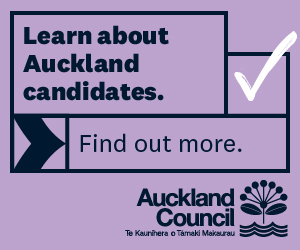
Auckland Council

Local democracy
Local government is a foundational part of our democracy. But local democracy isn’t just about holding elections every three years – it’s about the day-to-day ways people have their say in the decisions that affect us all.

Local democracy
Local government is a foundational part of our democracy. But local democracy isn’t just about holding elections every three years – it’s about the day-to-day ways people have their say in the decisions that affect us all.
Stop duplication of similar functions across the parent council and Council-controlled organisations through centralization of non-critical functions.
Reduce services and council size until non-rates revenue has fully recovered or funding gap closed.
Ensure the non-customer-faced staff including management do not exceed 20 percent of salary expenses across all departments.
Not support co-governance and only support Māori seats if the majority of the local community wishes this to happen.
Look to determine whether the current structure of the council is fit for purpose.
Not get involved with setting the wages of individual council workers but ensure that wages are set appropriately for the CEO.
Undertake a joint council/government review of the Supercity governance model to understand what has worked and what needs attention.
Introduce participatory democracy processes, including citizens assemblies, co-design structures to build trust in the council decision-making.
Require annual performance reviews for the mayor, councillors and local board members, and make these available for public scrutiny.
Stop predetermined perception of feedback to Have Your Say. Actively engage and speak up for my community – through meaningful connections.
Actively and honestly address the significant lack of trust and confidence between community and Auckland Council/Auckland Transport.
Not support co-governance and will support Māori seats if the majority of the local community wishes this to happen. More engagement needed.
Advocate for digital consultation at the time people get their rates with a sliding scale people can use to show their spending priorities.
Advocate for Māori wards and Māori seats on local boards. Advocate for a four day week for council staff.
Review and overhaul council's vastly expensive 'Report' culture and empower elected members to consult and make decisions more directly.
Council must continue to be more accessible to community, avoid consultation fatigue and engagement needs to be broader than just consultation.
Council must be a good treaty partner and live up to our Te Tiriti o Waitangi obligations. Work with mana whenua on strategy, plans and projects.
We must work with government to move away from postal voting and provide better more accessible ways of voting. Encourage youth engagement and turnout.
Stop duplication of similar functions across the parent council and Council-controlled organisations through centralization of non-critical functions.
Reduce services and council size until non-rates revenue has fully recovered or funding gap closed.
Ensure the non-customer-faced staff including management do not exceed 20 percent of salary expenses across all departments.
Not support co-governance and only support Māori seats if the majority of the local community wishes this to happen.
Look to determine whether the current structure of the council is fit for purpose.
Not get involved with setting the wages of individual council workers but ensure that wages are set appropriately for the CEO.
Undertake a joint council/government review of the Supercity governance model to understand what has worked and what needs attention.
Introduce participatory democracy processes, including citizens assemblies, co-design structures to build trust in the council decision-making.
Require annual performance reviews for the mayor, councillors and local board members, and make these available for public scrutiny.
Stop predetermined perception of feedback to Have Your Say. Actively engage and speak up for my community – through meaningful connections.
Actively and honestly address the significant lack of trust and confidence between community and Auckland Council/Auckland Transport.
Not support co-governance and will support Māori seats if the majority of the local community wishes this to happen. More engagement needed.
Advocate for digital consultation at the time people get their rates with a sliding scale people can use to show their spending priorities.
Advocate for Māori wards and Māori seats on local boards. Advocate for a four day week for council staff.
Review and overhaul council's vastly expensive 'Report' culture and empower elected members to consult and make decisions more directly.
Council must continue to be more accessible to community, avoid consultation fatigue and engagement needs to be broader than just consultation.
Council must be a good treaty partner and live up to our Te Tiriti o Waitangi obligations. Work with mana whenua on strategy, plans and projects.
We must work with government to move away from postal voting and provide better more accessible ways of voting. Encourage youth engagement and turnout.
Mayor
Compare the mayoral candidates in your area
Local council
Compare the candidates for your city or district council
Regional council
Compare the candidates for your regional council
Local board
Compare the candidates for your local or community board










